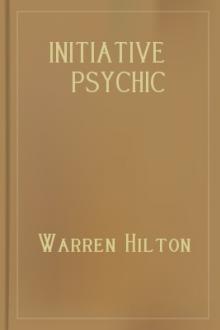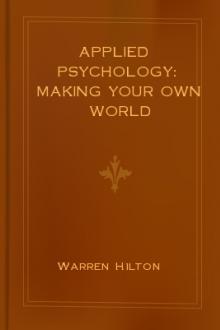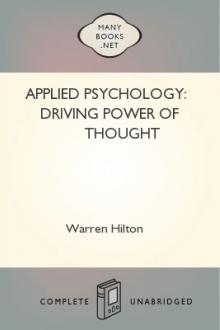author - "Warren Hilton"

elves, not after the usual manner of works on psychology, but solely from the standpoint of practical utility and for the establishment of a scientific concept of the mind capable of everyday use.
[Sidenote: Fundamental Laws and Practical Methods]
The elucidation of every principle of mental operation will be accompanied by illustrative material pointing out just how that particular law may be employed for the attainment of specific practical ends. There will be numerous illustrative instances and methods that can be at once made use of by the merchant, the musician, the salesman, the advertiser, the employer of labor, the business executive.
[Sidenote: Special Business Topics]
In this way this Basic Course of Reading will lay a firm and broad foundation, first, for an understanding of the methods and devices whereby any man may acquire full control and direction of his mental energies and may develop his resources to the last degree; second, for an understanding of the ps

Your quickened step, your new-found decisiveness of action, your more observant eye, your clear-cut speech instead of the former drawling utterance, your livelier manner, your freshened enthusiasm and enjoyment of life--all of these are but manifestations of a quickened intelligence.
[Sidenote: Quickened Mentality]
They are the working out through the motor paths of mental impulses to muscular action.
And these impulses to muscular action come thronging into consciousness because the livelier environment brings about a more rapid reproduction of memory pictures.
And here comes a particularly striking fact. One would naturally suppose that the more energy a man consumed, and the faster he lived, the more quickly his vitality would be exhausted and the shorter his life would be.
As a matter of fact, by the divine beneficence of Providence, your organism is so ordered as to adapt itself within certain wide limits to the demands made upon it

ave previously taken special notice of what I now have an image of. For instance, when I have an image of a certain person I cannot tell his particular characteristics unless my attention was formerly directed to them.'
"Another writes: 'There is no sound in connection with any image. In remembering, I call up an incident and gradually fill out the details. I can very seldom recall how anything sounds. One sound from the play "Robespierre," by Henry Irving, which I heard about two years ago and which I could recall some time afterward, I have been unable to recall this fall, though I have tried to do so. I can see the scene quite perfectly, the position of the actors and stage setting, even the action of a player who brought out the sound.'
"Quite a large proportion of persons find it impossible to imagine motion at all. As they think of a football game, all the players are standing stock-still; they are as they are represented in a photograph. They are in the act of running, but no motion is re

must be, in the nature of things, a latent capacity greater than has yet been discovered. And one discovery must lead to another until the man finds the deep wealth of his own possibilities. History is full of the acts of men who discovered somewhat of their own capacity; but history has yet to record the man who fully discovered all that he might have been."
[Sidenote: "Acres of Diamonds"]
You who are a bit vain of your visits to other lands, your wide reading, your experience of men and things; you who secretly lament that so little of what you have seen and read remains with you, behold, your "acres of diamonds" are within you, needing but the mystic formula that shall reveal the treasure!
THE MECHANISM OF RECALL
[Illustration: Decorative Header]
CHAPTER III
THE MECHANISM OF RECALL
[Sidenote: The Right Stimulus]
Somehow, somewhere, all experiences, whether subject to voluntary recall or not, are pre

tion Process]
The other aspect of the Sense-Perceptive Process has to do with the mental interpretation of environment.
Both these aspects are distinctly practical.
You should know something of the weaknesses and deficiencies of the sense-perceptive organs, because all your efforts at influencing other men are directed at their organs of sense.
You should understand the relationship between your mind and your environment, since they are the two principal factors in your working life.
CHAPTER III
SENSORY ILLUSIONS AND SUGGESTIONS FOR THEIR USE
[Sidenote: Unreliability of Sense-Organs]
Figure 1 shows two lines of equal length, yet the vertical line will to most persons seem longer than the horizontal one.
[Illustration: FIG. 1.]
In Figure 2 the lines A and B are of the same length, yet the lower seems much longer.
[Illustration: FIG. 2.]
Those things lo

p>The most important of these laws is the Law of Habit. In obedience to this law, the next idea to enter the mind will be the one that has been most frequently associated with the interesting part of the subject you are now thinking of.
The sight of a pile of manuscript on your desk ready for the printer, the thought of a printer, the word "printer," spoken or printed, calls to mind the particular printer with whom you have been dealing for some years.
The word "cocoa," the thought of a cup of cocoa, the mental picture of a cup of cocoa, may conjure with it not merely a steaming cup before the mind's eye and the flavor of the contents, but also a daintily clad figure in apron and cap bearing the brand of some well-known cocoa manufacturer.
If a typist or pianist has learned one system of fingering, it is almost impossible to change, because each letter, each note on the keyboard is associated with the idea of movement in a particular finger. Constant use has so welded th

elves, not after the usual manner of works on psychology, but solely from the standpoint of practical utility and for the establishment of a scientific concept of the mind capable of everyday use.
[Sidenote: Fundamental Laws and Practical Methods]
The elucidation of every principle of mental operation will be accompanied by illustrative material pointing out just how that particular law may be employed for the attainment of specific practical ends. There will be numerous illustrative instances and methods that can be at once made use of by the merchant, the musician, the salesman, the advertiser, the employer of labor, the business executive.
[Sidenote: Special Business Topics]
In this way this Basic Course of Reading will lay a firm and broad foundation, first, for an understanding of the methods and devices whereby any man may acquire full control and direction of his mental energies and may develop his resources to the last degree; second, for an understanding of the ps

Your quickened step, your new-found decisiveness of action, your more observant eye, your clear-cut speech instead of the former drawling utterance, your livelier manner, your freshened enthusiasm and enjoyment of life--all of these are but manifestations of a quickened intelligence.
[Sidenote: Quickened Mentality]
They are the working out through the motor paths of mental impulses to muscular action.
And these impulses to muscular action come thronging into consciousness because the livelier environment brings about a more rapid reproduction of memory pictures.
And here comes a particularly striking fact. One would naturally suppose that the more energy a man consumed, and the faster he lived, the more quickly his vitality would be exhausted and the shorter his life would be.
As a matter of fact, by the divine beneficence of Providence, your organism is so ordered as to adapt itself within certain wide limits to the demands made upon it

ave previously taken special notice of what I now have an image of. For instance, when I have an image of a certain person I cannot tell his particular characteristics unless my attention was formerly directed to them.'
"Another writes: 'There is no sound in connection with any image. In remembering, I call up an incident and gradually fill out the details. I can very seldom recall how anything sounds. One sound from the play "Robespierre," by Henry Irving, which I heard about two years ago and which I could recall some time afterward, I have been unable to recall this fall, though I have tried to do so. I can see the scene quite perfectly, the position of the actors and stage setting, even the action of a player who brought out the sound.'
"Quite a large proportion of persons find it impossible to imagine motion at all. As they think of a football game, all the players are standing stock-still; they are as they are represented in a photograph. They are in the act of running, but no motion is re

must be, in the nature of things, a latent capacity greater than has yet been discovered. And one discovery must lead to another until the man finds the deep wealth of his own possibilities. History is full of the acts of men who discovered somewhat of their own capacity; but history has yet to record the man who fully discovered all that he might have been."
[Sidenote: "Acres of Diamonds"]
You who are a bit vain of your visits to other lands, your wide reading, your experience of men and things; you who secretly lament that so little of what you have seen and read remains with you, behold, your "acres of diamonds" are within you, needing but the mystic formula that shall reveal the treasure!
THE MECHANISM OF RECALL
[Illustration: Decorative Header]
CHAPTER III
THE MECHANISM OF RECALL
[Sidenote: The Right Stimulus]
Somehow, somewhere, all experiences, whether subject to voluntary recall or not, are pre

tion Process]
The other aspect of the Sense-Perceptive Process has to do with the mental interpretation of environment.
Both these aspects are distinctly practical.
You should know something of the weaknesses and deficiencies of the sense-perceptive organs, because all your efforts at influencing other men are directed at their organs of sense.
You should understand the relationship between your mind and your environment, since they are the two principal factors in your working life.
CHAPTER III
SENSORY ILLUSIONS AND SUGGESTIONS FOR THEIR USE
[Sidenote: Unreliability of Sense-Organs]
Figure 1 shows two lines of equal length, yet the vertical line will to most persons seem longer than the horizontal one.
[Illustration: FIG. 1.]
In Figure 2 the lines A and B are of the same length, yet the lower seems much longer.
[Illustration: FIG. 2.]
Those things lo

p>The most important of these laws is the Law of Habit. In obedience to this law, the next idea to enter the mind will be the one that has been most frequently associated with the interesting part of the subject you are now thinking of.
The sight of a pile of manuscript on your desk ready for the printer, the thought of a printer, the word "printer," spoken or printed, calls to mind the particular printer with whom you have been dealing for some years.
The word "cocoa," the thought of a cup of cocoa, the mental picture of a cup of cocoa, may conjure with it not merely a steaming cup before the mind's eye and the flavor of the contents, but also a daintily clad figure in apron and cap bearing the brand of some well-known cocoa manufacturer.
If a typist or pianist has learned one system of fingering, it is almost impossible to change, because each letter, each note on the keyboard is associated with the idea of movement in a particular finger. Constant use has so welded th